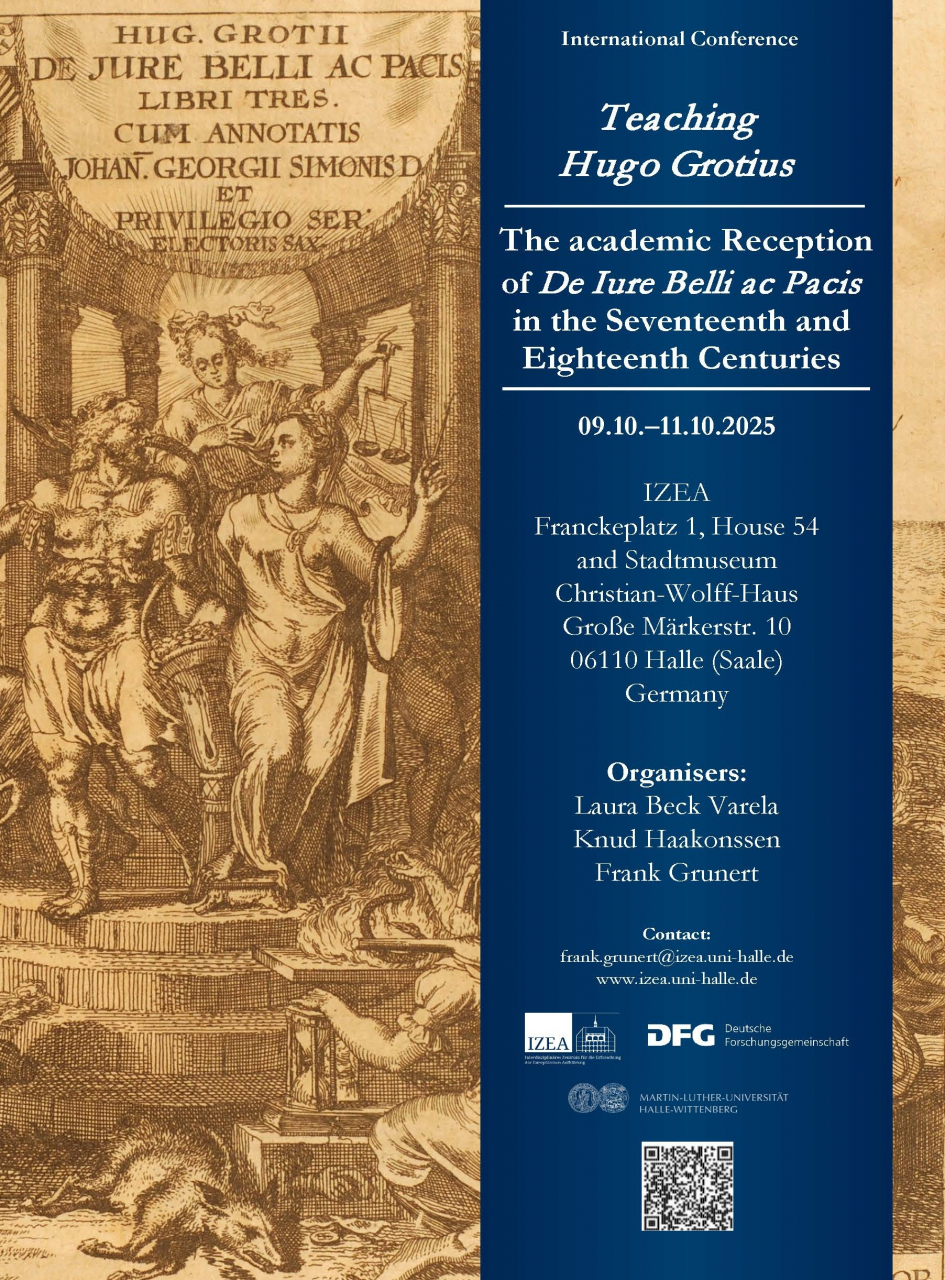Konferenz: Teaching Hugo Grotius. The academic Reception of De Iure Belli ac Pacis in the Seventeenth and Eighteenth Century
Tagung
NATURAL LAW 1625-1850. AN INTERNATIONAL RESEARCH PROJECT
Conference:
Teaching Hugo Grotius.
The academic Reception of De Iure Belli ac Pacis in the Seventeenth and Eighteenth Centuries
Venue: IZEA, MLU Halle-Wittenberg
Time: 09.10.–11.10.2025
Organisers: Laura Beck Varela, Knud Haakonssen, Frank Grunert
Contact: frank.grunert(at)izea.uni-halle.de

Hugo Grotius’s De Iure Belli ac Pacis, first published in Paris in 1625, is undoubtedly one of the most influential books ever written. By 1645 and thus during Grotius' lifetime, six editions had already appeared, and the number of editions and translations subsequently published worldwide is almost impossible to keep track of. Although originally presented as a fundamental work on the law of nations aimed at defining the legal framework for armed conflicts (seven years after the beginning of the Thirty Years' War), it was more than that. Already the subtitle announces that it is primarily intended to explain the "Jus Naturae et Gentium" and the "Jus Publicum". In fact, De Iure Belli ac Pacis offers a general jurisprudence with a stance on almost all matters of law from the perspective of possible violations.
Although the surviving evidence of the reception of De Iure Belli ac Pacis beginning soon after its publication is extensive and varied, the history of the book's significance has mostly been written in general terms. The quatercentenary of the publication offers a welcome opportunity to reconstruct this history in some detail.
A cursory overview will suggest different phases of the reception. Initially - i.e. in the second half of the 17th century - a commentary literature dominated that aimed at factual exposition of the work or invoked it for partisan support of a favoured doctrine. But Samuel Pufendorf turned exposition into detailed analysis and partisanship into a steppingstone for the author’s own theory, and teachers of natural law in the late 17th and 18th centuries similarly combined the two. Chr. Thomasius, J. G. Heineccius and Chr. Wolff are only the most prominent examples of creative readings of The Rights of War and Peace and only in the German context.
However, a reconstruction of the historically concrete reception of The Rights of War and Peace has to go beyond uncovering traces of Grotian thought in the juridical or philosophical treatises of his successors. Here the focus must be on the media of transmission and textual genres typical for the reception of De Iure Belli ac Pacis. Since the Grotius discussion – not only, but mainly – took place in academic teaching, or was closely connected to it, the corresponding texts and, where possible, their practical usage must be in the foreground: In addition to textbooks and dissertations, these include lecture notes, lecture announcements and lecture catalogues; works that made De Iure Belli ac Pacis teachable and accessible, such as commentaries and tables. In other words, the creative adaptations of the work, especially by editors and academic teachers in various disciplines, must be at the centre of any reconstruction of the productive reception of De Iure Belli ac Pacis.
A complete review of the dissemination of De Iure Belli ac Pacis is obviously not possible in a conference, but a wide-ranging programme with the concrete targets will make a difference. Historians of law, philosophy and politics will address aspects of this reception during the 17th and 18th centuries in widely different parts of the world by considering the types of sources mentioned.
The conference will focus first on various forms of academic presentation of Grotius' De Iure Belli ac Pacis, especially editions, lectures and tables. This will form the starting point for the subsequent historical-geographical section on a variety of different reception initiatives in different locales, presented in chronological order. Without pretending to provide a complete picture of the European reception of DIBP, the conference will offer focal points and patterns of perception that are suitable for answering the question of the specific appeal of DIBP. It is obvious that the interest was different at different times, in different regions and from the perspective of different disciplines, but exactly how and why remains to be seen in the contributions to the conference. Specifically, we will be testing the general impression that the early reception was concerned with the “true” presentation of Grotius’s theory, the later with superseding that theory.
Kontakt und weitere Informationen:
Tel.:+49 (0)345 55 21781
izea(at)izea.uni-halle.de

